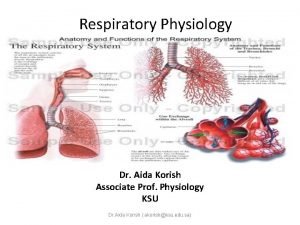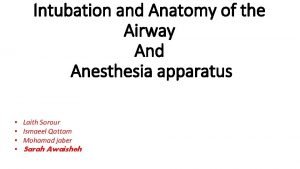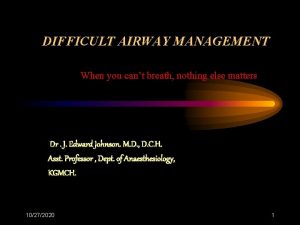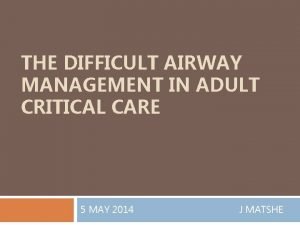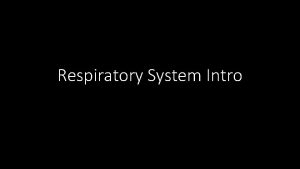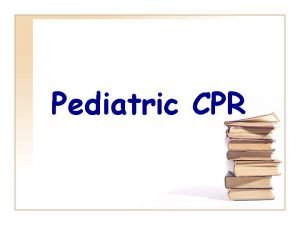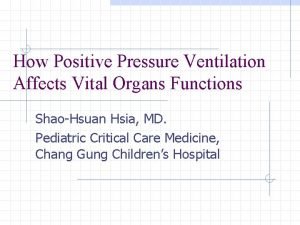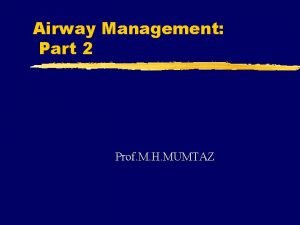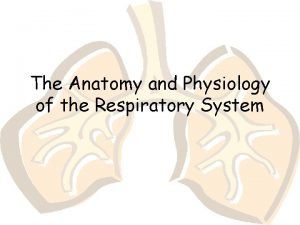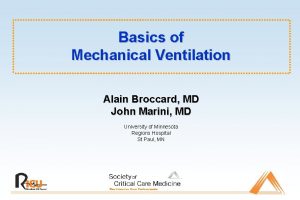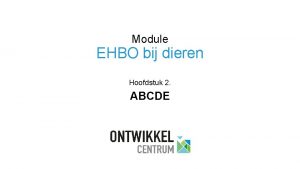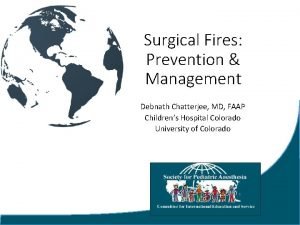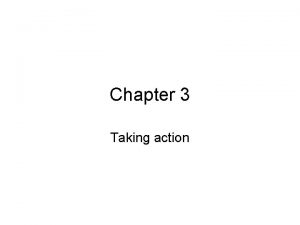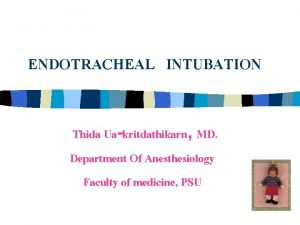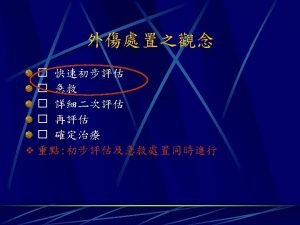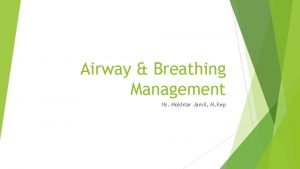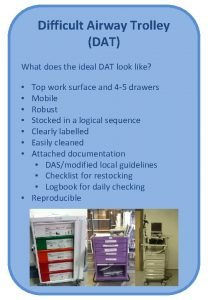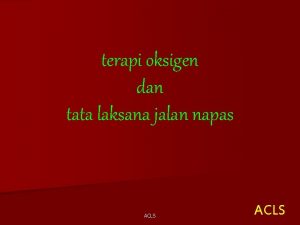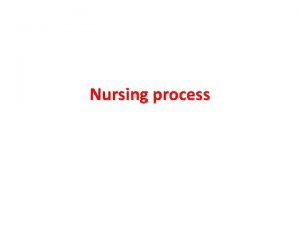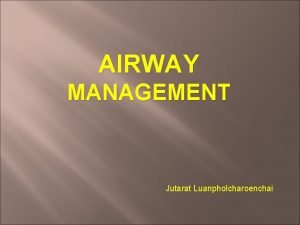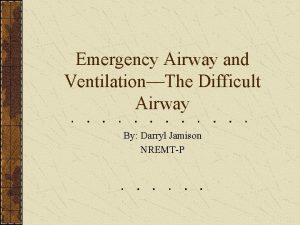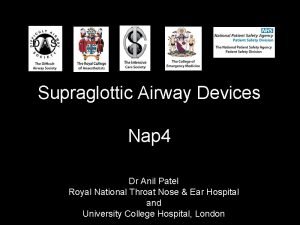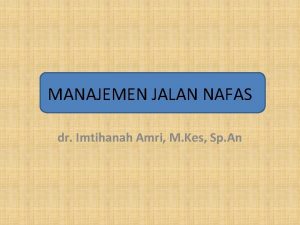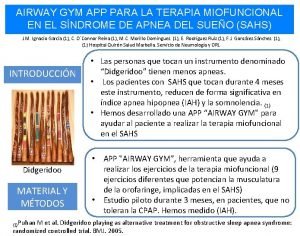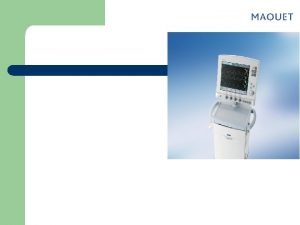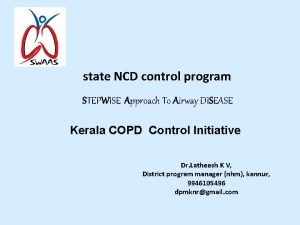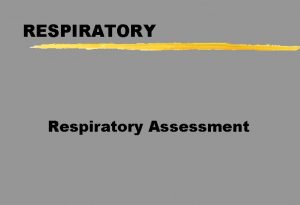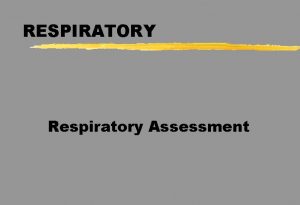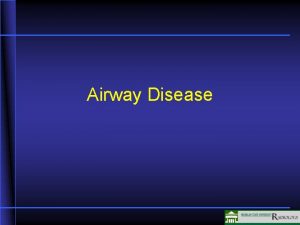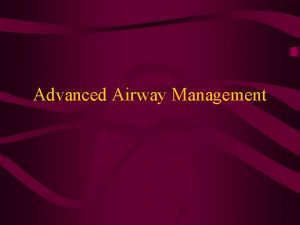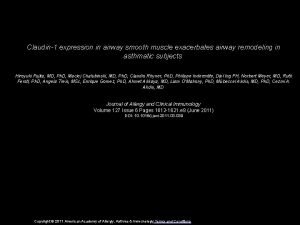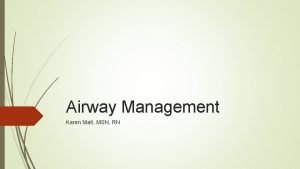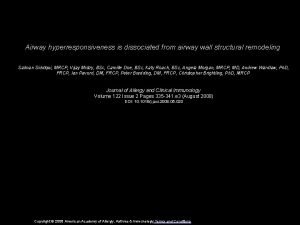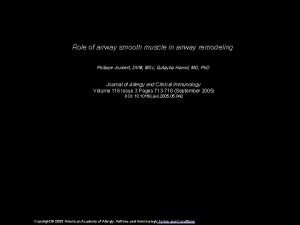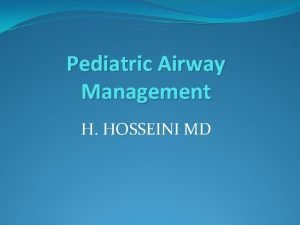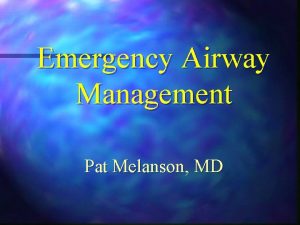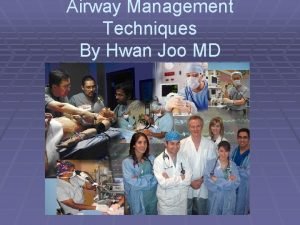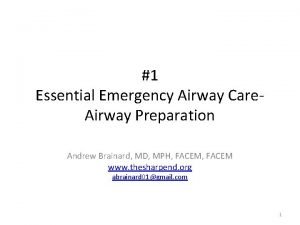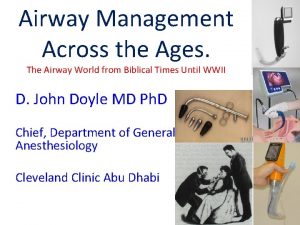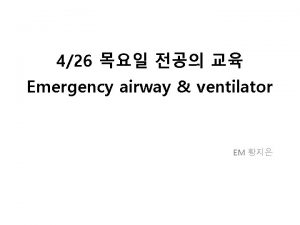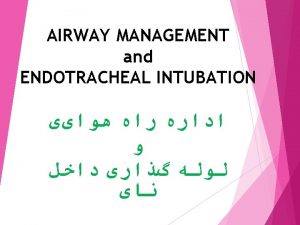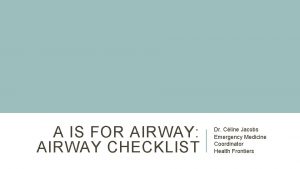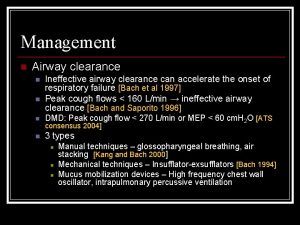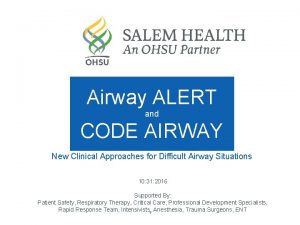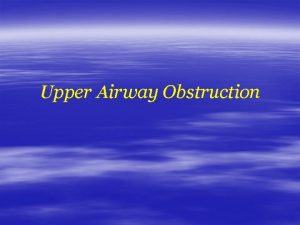RESPIRATORY Respiratory Assessment Respiratory Assessment Airway Listen To

































- Slides: 33

RESPIRATORY Respiratory Assessment

Respiratory Assessment • Airway – Listen - To Pt. Breathe or Talk • • Noisy Breathing is Obstructed Breathing Not All Obstructed Breathing is Noisy Snoring - Tongue Blocking Airway Stridor - “Tight” Upper Airway from Partial Obstruction

Respiratory Assessment – Anticipate Airway Problems in Patients With: » » » Decreased LOC Head Trauma Maxillofacial Trauma Neck Trauma Chest Trauma – OPEN - CLEAR - MAINTAIN

Respiratory Assessment • Breathing – Is the Pt. Moving Air? – Is the Pt. Moving Air Adequately? – Is the Pt’s Blood Being Oxygenated?

Respiratory Assessment – LOOK - LISTEN - FEEL • • Look for Symmetry of Chest Expansion Look for Signs of Increased Respiratory Effort Look for Changes in Skin Color Listen for Air Movement at Mouth & Nose Listen for Air Movement in Peripheral Lung Fields Feel for Air Movement at Mouth & Nose Feel for Symmetry of Chest Expansion

Respiratory Assessment – Tachypnea/Bradypnea? – Orthopneic? – Signs of Respiratory Distress • • • Nasal Flaring Tracheal Tugging Retractions Accessory Muscle Use of Abdominal Muscles on Exhalation

Respiratory Assessment – Cyanosis? (Late, unreliable sign of Hypoxia) – Oxygenate Immediately! Especially If: • • Decreased LOC Possible Shock Possible Severe Hemorrhage Chest Pain Chest Trauma Respiratory distress or dyspnea HX of any Kind of Hypoxia

Respiratory Assessment – Consider Assisting Ventilations • <10 • >24 • Insufficient Inspiratory O 2 (Tidal Volume Inadequate) – If the Pt. Has compromised breathing, bare the chest and assess for: • Open Pneumothorax • Flail Chest • Tension Pneumothorax

Respiratory Assessment – Platitudes • IF YOU CAN’T TELL WHETHER A PT. IS MOVING AIR ADEQUATELY, HE ISN’T! • THE NEED TO INTUBATE IS NOT THE SAME AS THE NEED TO VENTILATE! • IF YOU THINK ABOUT GIVING O 2, GIVE IT!

Respiratory Assessment • Circulation – Is the heart beating? – Is there major external hemorrhage? – Is the Pt. Perfusing? – Effects of hypoxia: • Early in adults - Tachycardia • Late in adults - Bradycardia • Children - Bradycardia

Respiratory Assessment – Don’t let respiratory failure distract you from assessing for circulatory failure. – Vascular Access

Respiratory Assessment • Disability – Restlessness, anxiety, combativeness = HYPOXIA Until Proven Otherwise – Drowsiness, lethargy = HYPERCARBIA When the Pt. Stops fighting, he is not necessarily getting better

Respiratory Assessment • Chief Complaint – Dyspnea • Subjective sensation that breathing is excessive, difficult, or uncomfortable

Respiratory Assessment – HX of Present Illness • • How long has dyspnea been present? Gradual or sudden onset? What aggravates or alleviates? Coughing? Productive cough? What does sputum look/smell like? Pain? What does the pain feel like?

Respiratory Assessment • Secondary Assessment – Respiratory Pattern • Kussmaul • Cheyne-Stokes • Central Neurogenic Hyperventilation

Respiratory Assessment • Secondary Assessment – Neck • • Trachea Midline? Jugular Vein Distention? Sub-cutaneous Emphysema? Accessory Muscle Use/Hypertrophy?

Respiratory Assessment • Secondary Assessment – Chest • • • Barrel Chest? Deformity/Discoloration/Symmetry? Flail Segment/Paradoxical Movement? Breath Sounds? Adventitious Sounds?

Respiratory Assessment • Secondary Assessment – Chest • • • Third Heart Sounds? (S 3) Tenderness/Instability? Sub-cutaneous Emphysema? Fremitus? Symmetrical Expansion? Dullness/Hyperresonance to Percussion?

Respiratory Assessment • Secondary Assessment – Extremities • Pre-tibial/Pedal Edema • Nailbed Color • “Clubbing” of digits

Adventitious Sounds • Snoring respiration – Upper Airway – Partial obstruction of the upper airway by the tongue • Stridor – High pitched crowing sound – Usually heard on inspiration – Indication of a tight upper airway

Adventitious Sounds • Wheezing – Whistling sound – Usually heard on expiration – Indication of narrowing of lower airways caused by: • Bronchospasm • Edema • Foreign material

Adventitious Sounds • Rhonchi – Rattling sound – Caused by mucus in larger airways • Rales – Fine crackling sound – Indication of fluid in the alveoli

Adventitious Sounds • Cough – Forced exhalation against partially closed glottis – Reflex response to mucosa irritation – Determine circumstances • At work • Postural changes • Lying down – Productive vs non-productive

Adventitious Sounds • Sneeze – Forced exhalation via nasal route – Clears nasal passages – Reflex response to mucosa irritation • Sighing – Slow, deep inspiration - Prolonged, audible exhalation – Reexpands areas of atelectasis

Adventitious Sounds • Hiccough – Hiccups, singultus – Spasm of diaphragm followed by glottic closure – No useful purpose – Benign, transient

Adventitious Sounds • Hiccough • Usually corrected by: – Breath-holding – Rebreathing from paper bag – Valsalva maneuver

Adventitious Sounds • Hiccough • Serious causes include: – Brain stem lesions – Increased intracranial pressure – Renal failure – Pancreatitis – Hepatitis – Liver cancer – Pneumonia

Chief Complaint • Dyspnea - Sensation that breathing is: – Excessive – Difficult – Uncomfortable

History of Present Illness • • How long? Onset gradual or sudden? What makes it better of worse? Cough? – Productive? – Sputum color? • Pain? – What kind?

Past History • Hypertension, AMI, diabetes – ? CHF with pulmonary edema • Chronic cough, smoking, recurrent flu – ? COPD • Allergies, acute/seasonal SOB episodes – ? Asthma

Past History • Lower extremity trauma, recent surgery, immobilization – ? Pulmonary embolism

Medications • Breathing Pills or Inhalers – Salbutamol – Atrovent – Flovent – Theophylline – Theo-Dur – Theofort • Asthma

Medications • CHF – Lasix – Diuril – Sprionolactone – Hydrodiuril – Digitalis – Ca channel blockers
 Upper airway and lower airway
Upper airway and lower airway Respiratory airway secretary
Respiratory airway secretary Jose feliciano rain
Jose feliciano rain Site:slidetodoc.com
Site:slidetodoc.com Lemon law airway assessment
Lemon law airway assessment Lemon anaesthesia
Lemon anaesthesia Respiratory zone vs conducting zone
Respiratory zone vs conducting zone Airway breathing c
Airway breathing c Mean airway pressure
Mean airway pressure Pharyngo-tracheal lumen airway
Pharyngo-tracheal lumen airway Upper respiratory tract
Upper respiratory tract Mean airway pressure formula
Mean airway pressure formula Abcde eerste hulp
Abcde eerste hulp Asa airway
Asa airway Cormack lehane
Cormack lehane The emergency action steps are
The emergency action steps are Lemon law anesthesie
Lemon law anesthesie Sniffing position
Sniffing position Lethal triad
Lethal triad Airway breathing management
Airway breathing management Mouth gag airway
Mouth gag airway Difficult airway trolley
Difficult airway trolley Indikasi nasopharyngeal airway
Indikasi nasopharyngeal airway Seeking consensual validation
Seeking consensual validation Head tilt chin lift
Head tilt chin lift Ahi cpap
Ahi cpap Thyromental distance of 7cm
Thyromental distance of 7cm Generations of supraglottic airway devices
Generations of supraglottic airway devices Jarak thyromental adalah
Jarak thyromental adalah Airway gym app
Airway gym app Aprv waveform
Aprv waveform Chandys maneuver
Chandys maneuver Stepwise approach to airway management
Stepwise approach to airway management Norwich terrier upper airway syndrome
Norwich terrier upper airway syndrome

